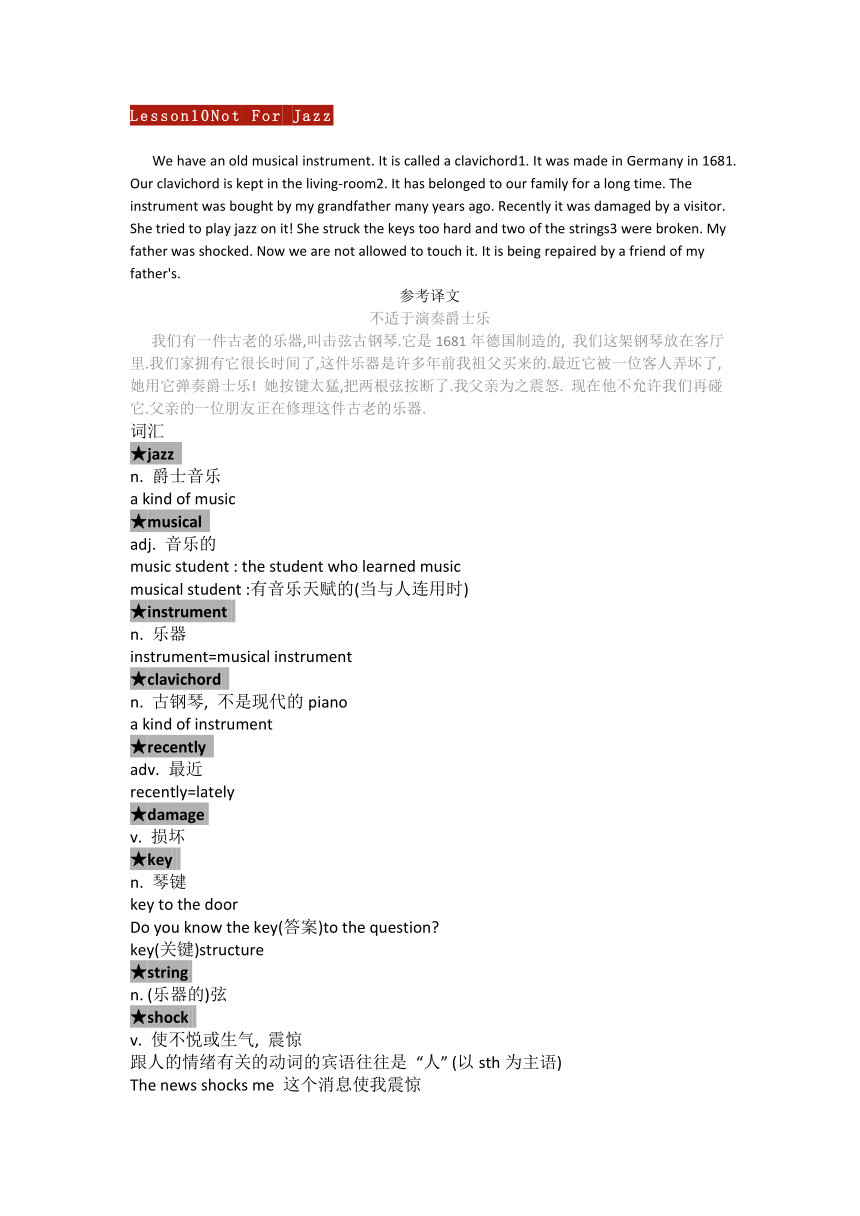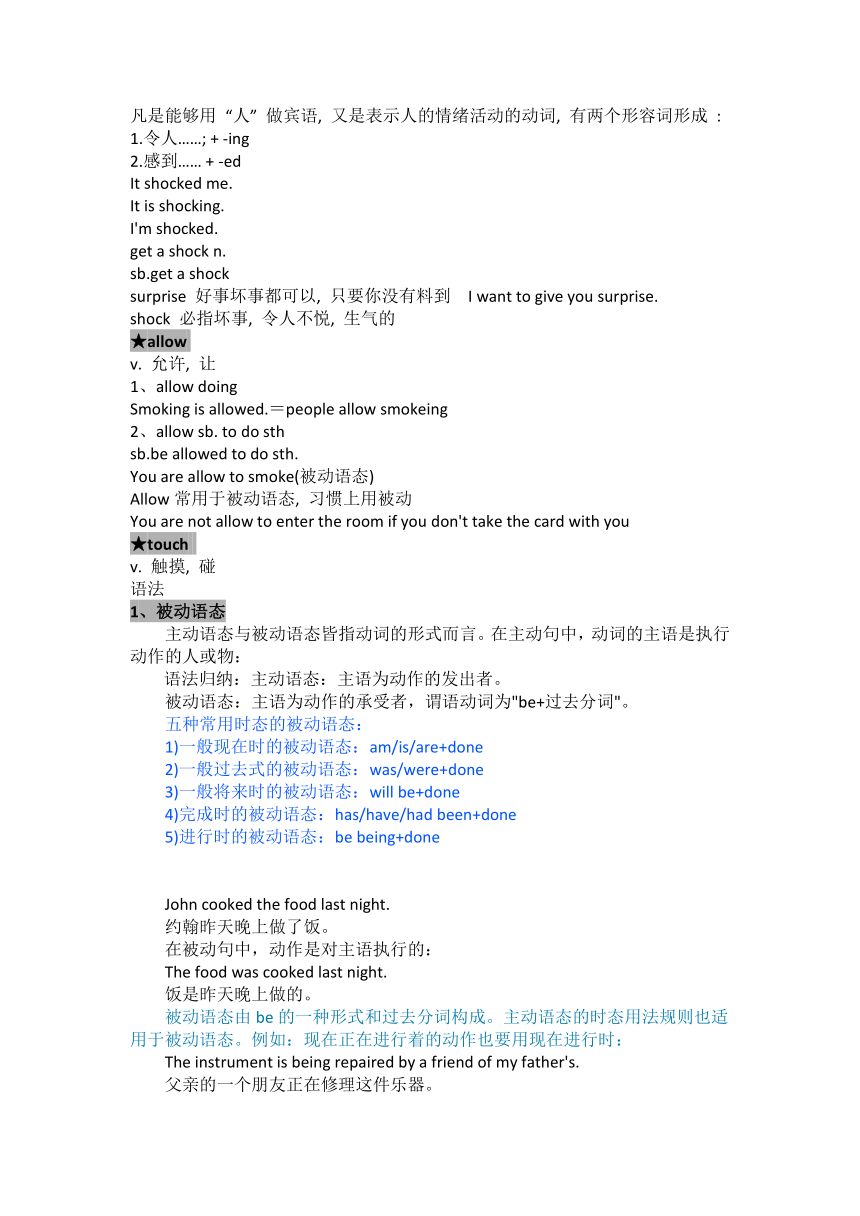新概念英语第二册 Lesson 10 Not For Jazz 讲义
文档属性
| 名称 | 新概念英语第二册 Lesson 10 Not For Jazz 讲义 |  | |
| 格式 | docx | ||
| 文件大小 | 21.9KB | ||
| 资源类型 | 教案 | ||
| 版本资源 | 新概念英语 | ||
| 科目 | 英语 | ||
| 更新时间 | 2023-09-27 22:50:24 | ||
图片预览



文档简介
Lesson10Not For Jazz
We have an old musical instrument. It is called a clavichord1. It was made in Germany in 1681. Our clavichord is kept in the living-room2. It has belonged to our family for a long time. The instrument was bought by my grandfather many years ago. Recently it was damaged by a visitor. She tried to play jazz on it! She struck the keys too hard and two of the strings3 were broken. My father was shocked. Now we are not allowed to touch it. It is being repaired by a friend of my father's.
参考译文
不适于演奏爵士乐
我们有一件古老的乐器,叫击弦古钢琴.它是1681年德国制造的, 我们这架钢琴放在客厅里.我们家拥有它很长时间了,这件乐器是许多年前我祖父买来的.最近它被一位客人弄坏了,她用它弹奏爵士乐! 她按键太猛,把两根弦按断了.我父亲为之震怒. 现在他不允许我们再碰它.父亲的一位朋友正在修理这件古老的乐器.
词汇
★jazz
n. 爵士音乐
a kind of music
★musical
adj. 音乐的
music student : the student who learned music
musical student :有音乐天赋的(当与人连用时)
★instrument
n. 乐器
instrument=musical instrument
★clavichord
n. 古钢琴, 不是现代的piano
a kind of instrument
★recently
adv. 最近
recently=lately
★damage
v. 损坏
★key
n. 琴键
key to the door
Do you know the key(答案)to the question
key(关键)structure
★string
n. (乐器的)弦
★shock
v. 使不悦或生气, 震惊
跟人的情绪有关的动词的宾语往往是 “人” (以sth为主语)
The news shocks me 这个消息使我震惊
凡是能够用 “人” 做宾语, 又是表示人的情绪活动的动词, 有两个形容词形成 :
1.令人……; + -ing
2.感到…… + -ed
It shocked me.
It is shocking.
I'm shocked.
get a shock n.
sb.get a shock
surprise 好事坏事都可以, 只要你没有料到 I want to give you surprise.
shock 必指坏事, 令人不悦, 生气的
★allow
v. 允许, 让
1、allow doing
Smoking is allowed.=people allow smokeing
2、allow sb. to do sth
sb.be allowed to do sth.
You are allow to smoke(被动语态)
Allow常用于被动语态, 习惯上用被动
You are not allow to enter the room if you don't take the card with you
★touch
v. 触摸, 碰
语法
1、被动语态
主动语态与被动语态皆指动词的形式而言。在主动句中,动词的主语是执行动作的人或物:
语法归纳:主动语态:主语为动作的发出者。
被动语态:主语为动作的承受者,谓语动词为"be+过去分词"。
五种常用时态的被动语态:
1)一般现在时的被动语态:am/is/are+done
2)一般过去式的被动语态:was/were+done
3)一般将来时的被动语态:will be+done
4)完成时的被动语态:has/have/had been+done
5)进行时的被动语态:be being+done
John cooked the food last night.
约翰昨天晚上做了饭。
在被动句中,动作是对主语执行的:
The food was cooked last night.
饭是昨天晚上做的。
被动语态由be的一种形式和过去分词构成。主动语态的时态用法规则也适用于被动语态。例如:现在正在进行着的动作也要用现在进行时:
The instrument is being repaired by a friend of my father's.
父亲的一个朋友正在修理这件乐器。
已经完成的动作要用完成时,动词作及物动词用(即动词后可加宾语)时才能构成被动语态。如果要说明是什么人或什么东西做了某事,则用“by+ 行为主体”结构:
I live in a very old town which is surrounded by beautiful woods.
我住在一个由美丽的树林环绕的古老小镇上。
That table was made by my grandfather.
那张桌子是我祖父做的。
“行为主体”也可以不表示出来:
This piano was made in England.
这架钢琴是英国造的。
The car was repaired last week.
这辆车是上星期修的。
2.双重所有格(The double genitive)
-'s 结构的所有格也可用于“of结构”之后,如:a friend of my father's(我父亲的一位朋友),意思是我父亲的许多朋友之一。
出现这种情况是因为在一个名词前通常只用一个限定词。
例如在son一词之前,我们不会同时用this和my两个限定词,而只可说this son of mine(我的这个儿子)。其他一些表示所属关系的代词的例子如a friend of yours(你的一个朋友),an uncle of hers(她的一个叔叔)等。
在名词前面,我们可以用a, this,that, these, some, any, no等等,但不用 the。He is a friend of mine(他是我的一个朋友)比 He is my friend 更常用,后者含有“他是我的一个特殊的或惟一的朋友”之意。而 He is no friend of mine 的含义是“我根本不认识他”或“他是我的敌人”。
课文讲解
1.We have an old musical instrument..It is called a clavichord.
语言点1 call的用法:
1)call sb. sth.把某人叫做……
2)sb./sth.be called(被动语态)
语言点2 call的常用短语:
1)call on拜访,看望:I shall call on my teacher tomorrow.明天我将去看望我的老师。
2)call off(=cancel,delete)取消:The next outdoor meeting has been called off.下次的户外会议被取消了。
3)call for需要,要求;值得:The occasion calls for a cool head.这种场合需要冷静的头脑。
4)call up(=call upon)召集,动员,拜访:We called up all students on the playground.我们把所有的学生都召集到操场上。
5)call one's name叫某人的名字
6)call one's name(=say "F" words)说脏话
2.It was made in Germany in 1681.
语言点1 was made为过去时的被动语态。
语言点2 句型结构"be made+介词短语"
1)be made in somewhere在……地方制造
2)be made of由……制造(能看出原材料):The bridge is made of wood.这座桥是用木头造的。
3)be made from由……制造(看不出原材料):The beer is made from malt, hop and water.啤酒是麦芽、啤酒花和水酿制而成的。
4)be made into被制成了……:This diamond was made into a ring.这颗钻石被制成了一枚戒指。
5)be made by sb.被某人制造:That nice wood chair was made by my uncle.那把精美的木椅子是我叔叔做的。
3.Our clavichord is kept in the living-room.
语言点1 is kept为现在时的被动语态:“现在被保存在……”
语言点2 有关房屋的表达:attic阁楼;living room客厅;hall门厅;aisle过道;bedroom卧室;bathroom浴室;kitchen厨房;basement地下室;garage车库;storeroom储藏室
4.It has belong to our family for a long time.
语言点1 belong to的用法:
1)属于;为……财产:That book belongs to me.那本书属于我。
2)成为……的一员:Which fishing club do you belong to 你是哪家钓鱼俱乐部的成员
语言点2 for a long time表示“很长一段时间”,往往表示一段时间,经常和完成时态搭配使用。
5.The instrument was bought by my grandfather many years ago.
语言点 many years ago决定了句子的时态为一般过去时,...ago作时间状语句子往往用一般过去时,而since则常常出现在完成时态中。
6.Recently it was damaged by a visitor.
语言点 visitor指“游客,观光者,访问者”:Visitor Not Admittted谢绝参观
7.She tried to play jazz on it!
语言点 1)play sth. on+乐器表示在何种乐器上演奏某种音乐;
2)play+the+乐器表示演奏何种乐器。
8.She struck the keys too hard and two of the strings were broken.
语言点 比较学习:too, very
1)too表示“太,过于”:The scenery is too beautiful for words.风景美得无法形容。/You walked too quickly.你走的实在是太快了。
2)very表示“非常,很”(在合理的范围内):She was very hurt by her boyfriend's unkind words.她男朋友说的那些难听的话,让她很伤心。
9.My father was shocked.
语言点 shocked既可作形容词,意为“感到震惊的”,也是动词过去分词,用于被动语态,意为“被震惊”。
I was very much shocked at what I saw.眼前的情景让我大为震惊。
10.Now we are not allowed to touch it.It is being repaired by a friend of my father's.
语言点1 It is being repaired by...为典型的现在进行时的被动语态。
语言点2 名词的双重所有格结构:of+ -'s
a friend of my mother's我母亲的一个朋友
a picture of Lynn's林恩的一张照片
We have an old musical instrument. It is called a clavichord1. It was made in Germany in 1681. Our clavichord is kept in the living-room2. It has belonged to our family for a long time. The instrument was bought by my grandfather many years ago. Recently it was damaged by a visitor. She tried to play jazz on it! She struck the keys too hard and two of the strings3 were broken. My father was shocked. Now we are not allowed to touch it. It is being repaired by a friend of my father's.
参考译文
不适于演奏爵士乐
我们有一件古老的乐器,叫击弦古钢琴.它是1681年德国制造的, 我们这架钢琴放在客厅里.我们家拥有它很长时间了,这件乐器是许多年前我祖父买来的.最近它被一位客人弄坏了,她用它弹奏爵士乐! 她按键太猛,把两根弦按断了.我父亲为之震怒. 现在他不允许我们再碰它.父亲的一位朋友正在修理这件古老的乐器.
词汇
★jazz
n. 爵士音乐
a kind of music
★musical
adj. 音乐的
music student : the student who learned music
musical student :有音乐天赋的(当与人连用时)
★instrument
n. 乐器
instrument=musical instrument
★clavichord
n. 古钢琴, 不是现代的piano
a kind of instrument
★recently
adv. 最近
recently=lately
★damage
v. 损坏
★key
n. 琴键
key to the door
Do you know the key(答案)to the question
key(关键)structure
★string
n. (乐器的)弦
★shock
v. 使不悦或生气, 震惊
跟人的情绪有关的动词的宾语往往是 “人” (以sth为主语)
The news shocks me 这个消息使我震惊
凡是能够用 “人” 做宾语, 又是表示人的情绪活动的动词, 有两个形容词形成 :
1.令人……; + -ing
2.感到…… + -ed
It shocked me.
It is shocking.
I'm shocked.
get a shock n.
sb.get a shock
surprise 好事坏事都可以, 只要你没有料到 I want to give you surprise.
shock 必指坏事, 令人不悦, 生气的
★allow
v. 允许, 让
1、allow doing
Smoking is allowed.=people allow smokeing
2、allow sb. to do sth
sb.be allowed to do sth.
You are allow to smoke(被动语态)
Allow常用于被动语态, 习惯上用被动
You are not allow to enter the room if you don't take the card with you
★touch
v. 触摸, 碰
语法
1、被动语态
主动语态与被动语态皆指动词的形式而言。在主动句中,动词的主语是执行动作的人或物:
语法归纳:主动语态:主语为动作的发出者。
被动语态:主语为动作的承受者,谓语动词为"be+过去分词"。
五种常用时态的被动语态:
1)一般现在时的被动语态:am/is/are+done
2)一般过去式的被动语态:was/were+done
3)一般将来时的被动语态:will be+done
4)完成时的被动语态:has/have/had been+done
5)进行时的被动语态:be being+done
John cooked the food last night.
约翰昨天晚上做了饭。
在被动句中,动作是对主语执行的:
The food was cooked last night.
饭是昨天晚上做的。
被动语态由be的一种形式和过去分词构成。主动语态的时态用法规则也适用于被动语态。例如:现在正在进行着的动作也要用现在进行时:
The instrument is being repaired by a friend of my father's.
父亲的一个朋友正在修理这件乐器。
已经完成的动作要用完成时,动词作及物动词用(即动词后可加宾语)时才能构成被动语态。如果要说明是什么人或什么东西做了某事,则用“by+ 行为主体”结构:
I live in a very old town which is surrounded by beautiful woods.
我住在一个由美丽的树林环绕的古老小镇上。
That table was made by my grandfather.
那张桌子是我祖父做的。
“行为主体”也可以不表示出来:
This piano was made in England.
这架钢琴是英国造的。
The car was repaired last week.
这辆车是上星期修的。
2.双重所有格(The double genitive)
-'s 结构的所有格也可用于“of结构”之后,如:a friend of my father's(我父亲的一位朋友),意思是我父亲的许多朋友之一。
出现这种情况是因为在一个名词前通常只用一个限定词。
例如在son一词之前,我们不会同时用this和my两个限定词,而只可说this son of mine(我的这个儿子)。其他一些表示所属关系的代词的例子如a friend of yours(你的一个朋友),an uncle of hers(她的一个叔叔)等。
在名词前面,我们可以用a, this,that, these, some, any, no等等,但不用 the。He is a friend of mine(他是我的一个朋友)比 He is my friend 更常用,后者含有“他是我的一个特殊的或惟一的朋友”之意。而 He is no friend of mine 的含义是“我根本不认识他”或“他是我的敌人”。
课文讲解
1.We have an old musical instrument..It is called a clavichord.
语言点1 call的用法:
1)call sb. sth.把某人叫做……
2)sb./sth.be called(被动语态)
语言点2 call的常用短语:
1)call on拜访,看望:I shall call on my teacher tomorrow.明天我将去看望我的老师。
2)call off(=cancel,delete)取消:The next outdoor meeting has been called off.下次的户外会议被取消了。
3)call for需要,要求;值得:The occasion calls for a cool head.这种场合需要冷静的头脑。
4)call up(=call upon)召集,动员,拜访:We called up all students on the playground.我们把所有的学生都召集到操场上。
5)call one's name叫某人的名字
6)call one's name(=say "F" words)说脏话
2.It was made in Germany in 1681.
语言点1 was made为过去时的被动语态。
语言点2 句型结构"be made+介词短语"
1)be made in somewhere在……地方制造
2)be made of由……制造(能看出原材料):The bridge is made of wood.这座桥是用木头造的。
3)be made from由……制造(看不出原材料):The beer is made from malt, hop and water.啤酒是麦芽、啤酒花和水酿制而成的。
4)be made into被制成了……:This diamond was made into a ring.这颗钻石被制成了一枚戒指。
5)be made by sb.被某人制造:That nice wood chair was made by my uncle.那把精美的木椅子是我叔叔做的。
3.Our clavichord is kept in the living-room.
语言点1 is kept为现在时的被动语态:“现在被保存在……”
语言点2 有关房屋的表达:attic阁楼;living room客厅;hall门厅;aisle过道;bedroom卧室;bathroom浴室;kitchen厨房;basement地下室;garage车库;storeroom储藏室
4.It has belong to our family for a long time.
语言点1 belong to的用法:
1)属于;为……财产:That book belongs to me.那本书属于我。
2)成为……的一员:Which fishing club do you belong to 你是哪家钓鱼俱乐部的成员
语言点2 for a long time表示“很长一段时间”,往往表示一段时间,经常和完成时态搭配使用。
5.The instrument was bought by my grandfather many years ago.
语言点 many years ago决定了句子的时态为一般过去时,...ago作时间状语句子往往用一般过去时,而since则常常出现在完成时态中。
6.Recently it was damaged by a visitor.
语言点 visitor指“游客,观光者,访问者”:Visitor Not Admittted谢绝参观
7.She tried to play jazz on it!
语言点 1)play sth. on+乐器表示在何种乐器上演奏某种音乐;
2)play+the+乐器表示演奏何种乐器。
8.She struck the keys too hard and two of the strings were broken.
语言点 比较学习:too, very
1)too表示“太,过于”:The scenery is too beautiful for words.风景美得无法形容。/You walked too quickly.你走的实在是太快了。
2)very表示“非常,很”(在合理的范围内):She was very hurt by her boyfriend's unkind words.她男朋友说的那些难听的话,让她很伤心。
9.My father was shocked.
语言点 shocked既可作形容词,意为“感到震惊的”,也是动词过去分词,用于被动语态,意为“被震惊”。
I was very much shocked at what I saw.眼前的情景让我大为震惊。
10.Now we are not allowed to touch it.It is being repaired by a friend of my father's.
语言点1 It is being repaired by...为典型的现在进行时的被动语态。
语言点2 名词的双重所有格结构:of+ -'s
a friend of my mother's我母亲的一个朋友
a picture of Lynn's林恩的一张照片
同课章节目录
